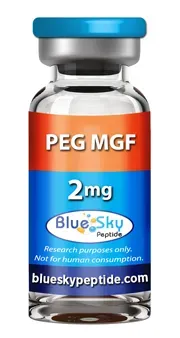45% Off Everything*
Save Now!!

| Unit Size | 2 mg/vial |
| Unit Quantity | 1 vial |
| Purity (Mass Spectrometry and UV) | 99.4% |
| Sequence | PEG-Suc-YQPPSTNKNTKSQ(d)R(d)RKGSTFEEHKNH2 |
| Molecular Formula | C121H200N42O39 |
| Appearance | Lyophilized White Powder |
| Source | Chemical Synthesis |
| Storage |
Lyophilized PEG MGF is Stable at room Temperature for 90 days, however it is best to store in a freeze below - 8c for any extended period of time. After reconstitution PEG MGF should be refrigerated at temperatures not to exceed 35 F. |
| Terms | The products we offer are intended for laboratory research use only. Please familiarize yourself with our terms of service prior to ordering. |
PEG MGF is a synthetic analog of the mechano-growth factor (MGF) peptide. PEG MGF is a version of the MGF peptide that has polyethylene glycol (PEG) attached to it, done in a process known as PEGylation. This increases the half-life of the molecule because it prevents elimination by the kidneys.1 PEG MGF was developed because MGF has a short half-life, making it difficult to use in studies. MGF is a splice variant of insulin-like growth factor-1 (IGF-1), which was originally discovered in skeletal muscle tissues. Expression of MGF induces myoblasts to grow and differentiate in response to muscle injury or stress in order to repair damaged tissues. In mouse studies, MGF has been directly injected into muscle tissues to enhance recovery through limiting oxidative stress and recruitment of inflammatory immune cells.2,3 While its main roles have been studied in muscle, PEG MGF may also be useful in studying cardiac repair mechanisms. In vitro studies using microrods that mimic heart stiffness with PEG and MGF were performed. One found that human mesenchymal stem cells migrated towards MGF, highlighting its potential role in cardiac tissue repair. In neonatal rat ventricular stem cells, apoptosis was inhibited with exposure to MGF.4 The same effect may be seen in cartilage growth and repair, as MGF stimulates the migration of chondrocytes from the bone to the cartilage.
PEG MGF is available as a white lyophilized powder at a concentration of 2 mg/vial. This product is intended for laboratory research purposes only.
References: 1. Veronese FM, Mero A. The impact of PEGylation on biological therapies. BioDrugs. 2008;22(5):315-29. 2. Sun K, Cheung K, Au SWN, et al. Overexpression of Mechano-Growth Factor Modulates Inflammatory Cytokine Expression and Macrophage Resolution in Skeletal Muscle Injury. Front Physiol. 2019;9:999. 3. Liu X, Zeng Z, Chao L, et al. Impaired Skeletal Muscle Regeneration Induced by Macrophage Depletion Could Be Partly Ameliorated by MGF Injection. Front Physiol. 2019;10:601. 4. Doroudian G, Pinney J, Ayala P, et al. Sustained delivery of MGF peptide from microrods attracts stem cells and reduces apoptosis of myocytes. 5. Jing X, Ye Y, Bao Y, et al. Mechano-growth factor protects against mechanical overload induced damage and promotes migration of growth plate chondrocytes through RhoA/YAP pathway. Exp Cell Res. 2018;366(2):81-91.